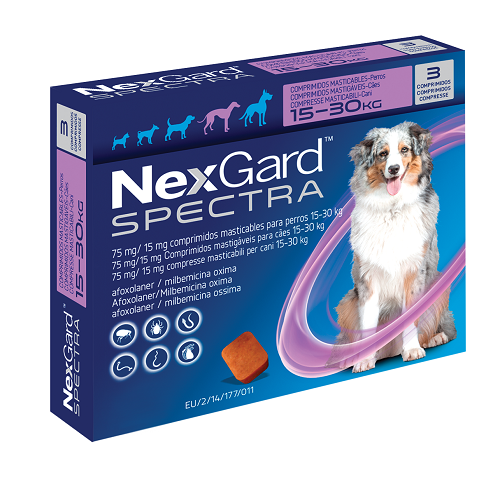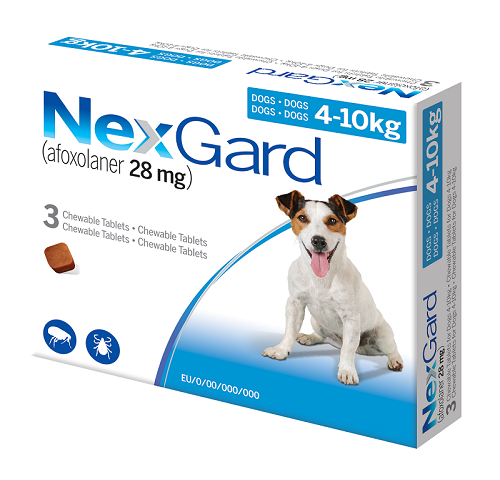Boehringer Ingelheim announces two new claims for Nexgard® and Nexgard Spectra® in the EU and Australia
- Boehringer Ingelheim expands the label claims of its NexGard® brands for the treatment of two severe skin diseases in dogs in the EU and in Australia
- By broadening the range, Boehringer Ingelheim contributes to the improvement of dogs’ health globally
Ingelheim, Germany, 28 November 2018 – Boehringer Ingelheim received approval to expand the label claims for its NexGard® brands for the treatment of two severe skin diseases in dogs. Both NexGard® and NexGard Spectra® are now approved for the treatment of the cutaneous diseases demodicosis (caused by the Demodex canis mite) as well as sarcoptic mange (caused by the Sarcoptes scabiei var. canis mite), both in the EU and in Australia.
Canine demodicosis, also called demodectic mange, is considered one of the most severe skin diseases in dogs, which can be life-threatening. Demodex mites live in the hair follicles and sebaceous glands of the dog’s skin. They induce strong skin inflammatory reaction with erythema, seborrhea, and hair loss, usually starting on the muzzle and head and progressing towards the rear. The majority of dogs are naturally infested and healthy carriers, and the mites can be transferred from mother to puppies. Most healthy animals are able to inhibit mite proliferation and live with a limited mite population. If a dog develops generalised demodicosis, this usually means that the immune system is compromised, either due to genetic factors, or to intercurrent diseases such as cancer or diabetes.
Canine scabies, also called sarcoptic mange, is a generalised dermatitis in dogs and often difficult to diagnose. The disease is caused by the Sarcoptes scabiei mite, a highly contagious skin parasite. The mites burrow into the skin and cause severe itching, which may result in the formation of scabs and hair loss. It is a non-seasonal parasite that can be found in dogs of all ages and breeds. “Sarcoptes mites are not only easily transferred between dogs, but are zoonotic parasites which can be passed from animals to humans,” explains Prof. Fred Beugnet, Head of Global Veterinary Technical Services, Parasiticides, at Boehringer Ingelheim. “This is why the treatment of this disease is crucial for animals’ as well as humans’ health.”
The approvals by the European Commission and Australian Pesticides and Veterinary Medicines Authority are based on three experimental studies1 and two well-controlled field studies2 demonstrating the exceptional efficacy of the afoxolaner molecule. “Both field studies in Europe clearly confirmed the safety and efficacy against the two diseases of the administration of both NexGard® and NexGard Spectra®,” shares Prof. Fred Beugnet. The canine demodicosis study showed an overall efficacy of afoxolaner of more than 98 per cent.
The studies on sarcoptic mange showed an almost 100 per cent efficacy against mites after just one administration.
“As animal well-being is the core focus of our business, we are proud to broaden our NexGard® range with these new claims and thus contribute to the improvement of dogs’ health,” says Dr. Jean-Philippe Tronel, Global Brand Director, Boehringer Ingelheim. “In addition, both products offer an oral treatment that is easier and more appreciated by dogs than the existing solutions.”
|
 |
 |
About NexGard® and NexGard Spectra®
NexGard® contains the active ingredient afoxolaner and was the first oral medication that treats both fleas and ticks in dogs. Because of its efficacy, safety and palatable, beef-flavoured soft chew formulation, NexGard® - with €546 million sales in 2017 - was the best-selling pet medication in the animal health industry as well as Boehringer Ingelheim’s no. 1 product3. NexGard Spectra® combines the flea and tick efficacy of afoxolaner in NexGard® with a broad-spectrum deworming ingredient, milbemycin oxime, in the same beef-flavoured chew. NexGard Spectra® is not only effective in treating fleas and ticks, but also protects dogs against deadly parasites such as heartworm and lungworm as well as the most common gastrointestinal parasites.
For more details, please see our Annual Report 2017 product portfolio.
References:
1Beugnet F, Halos L, Larsen D, de Vos C. Efficacy of oral afoxolaner for the treatment of canine generalised demodicosis. Parasite 2016;23:14.
Steffen Rehbein, Christa de Vos, Frédéric Beugnet, Doug Carithers, Josephus Fourie. Efficacy of once-monthly doses of oral afoxolaner and afoxolaner/milbemycin oxime in a well-controlled study for the treatment of canine generalised demodicosis. 2018_ Open Journal of Veterinary medicine. Accepted for publication
Beugnet F, de Vos C, Liebenberg L, Halos L, Diane D, Fourie J. Efficacy of afoxolaner in a clinical field study in dogs naturally infested with Sarcoptes scabiei. Parasite. 2016;23:26.
2Wilfried Lebon, Massimo Beccati, Patrick Bourdeau, Thomas Brement, Vincent Bruet, Agnieszka Cekiera, Odile Crosaz, Céline Darmon, Jacques Guillot, Marion Mosca, Didier Pin, Jaroslaw Popiel, Dorota Pomorska Handwerker, Diane Larsen, Eric Tielemans, Frédéric Beugnet and Lénaïg Halos. Efficacy of two formulations of afoxolaner (NexGard® and NexGard Spectra®) for the treatment of generalised demodicosis in dogs, in veterinary dermatology referral centers in Europe. Parasites & Vectors 2018 11:506.
Verena Hampel, Jürgen Schäfer, Martin Knaus, Frederic Beugnet, Steffen Rehbein. Treatment of canine sarcoptic mange with afoxolaner (NexGard®) and afoxolaner plus milbemycin oxime (NexGard Spectra®) chewable tablets: efficacy under field conditions in Europe. 2018_Parasite. Accepted for publication
3Internal data on file, 2017
Boehringer Ingelheim
Improving the health and quality of life of patients is the goal of the research-driven pharmaceutical company Boehringer Ingelheim. The focus in doing so is on diseases for which no satisfactory treatment option exists to date. The company therefore concentrates on developing innovative therapies that can extend patients’ lives. In animal health, Boehringer Ingelheim stands for advanced prevention.
Family-owned since it was established in 1885, Boehringer Ingelheim is one of the pharmaceutical industry’s top 20 companies. Some 50,000 employees create value through innovation daily for the three business areas human pharmaceuticals, animal health and biopharmaceuticals. In 2017, Boehringer Ingelheim achieved net sales of nearly 18.1 billion euros. R&D expenditure, exceeding three billion euros, corresponded to 17.0 per cent of net sales.
As a family-owned company, Boehringer Ingelheim plans in generations and focuses on long-term success, rather than short-term profit. The company therefore aims at organic growth from its own resources with simultaneous openness to partnerships and strategic alliances in research. In everything it does, Boehringer Ingelheim naturally adopts responsibility towards mankind and the environment.
More information about Boehringer Ingelheim can be found on www.boehringer-ingelheim.com or in our Annual Report.
Boehringer Ingelheim Animal Health Business Unit
Boehringer Ingelheim is the second largest animal health business in the world. We are committed to creating animal wellbeing through our large portfolio of advanced, preventive healthcare products and services. With net sales of 3.9 billion euros (2017) and around 10,000 employees worldwide, we are present in more than 150 markets. For more information click here.
Intended audiences:
This press release is issued from our Corporate Headquarters in Ingelheim, Germany, and is intended to provide information about our global business. Please be aware that information relating to the approval status and labels of approved products may vary from country to country, and a country-specific press release on this topic may have been issued in the countries where we do business.


